|
|
|
Sort Order |
|
|
|
Items / Page
|
|
|
|
|
|
|
| Srl | Item |
| 1 |
ID:
089211
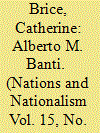

|
|
|
|
|
| Publication |
2009.
|
| Summary/Abstract |
In the light of certain criticisms made of Alberto Banti's work (Mazzonis 2002: Beales and Biagini 2002), it may seem strange to defend him by calling him a historian of politics (even in spite of himself).
|
|
|
|
|
|
|
|
|
|
|
|
|
|
|
|
| 2 |
ID:
160854
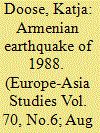

|
|
|
|
|
| Summary/Abstract |
Natural disasters can sometimes have a tremendous impact on societies and can even contribute to the outbreak of violent conflicts. The onset of the Nagorno-Karabakh conflict is usually attributed to the lack of Soviet control over the periphery and the consequent ‘resurgence of ethnicity’. Based on an analysis of how the main political actors in Moscow and the Caucasus framed the 1988 earthquake in Armenia in opposition to each other, this essay shifts the focus from political history to environmental history to argue that the disaster, and the narratives revolving around its origin and meaning, can further explain the exacerbation of the conflict.
|
|
|
|
|
|
|
|
|
|
|
|
|
|
|
|
| 3 |
ID:
138268
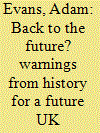

|
|
|
|
|
| Summary/Abstract |
Amid the fallout from the Scottish independence referendum, a UK constitutional convention has been proposed as a mechanism to take stock not only of the referendum, but also of the past fifteen years of devolution. However, despite longstanding conceptions of British constitutional development, a constitutional convention would not herald a brave new world for the UK's constitution. As the article highlights, in the past hundred years there have been two attempts to treat the territorial constitution in the round: the Speaker's Conference on Devolution, 1919–1920 and the Royal Commission on the Constitution, 1969–1973. This article examines both of these forums, arguing that they provide clear warnings for a future UK constitutional convention, in particular the threat of internal division that any such forum risks facing. A danger that this article highlights is heightened by the associated difficulty of reaching agreement across the UK's ‘state of unions’.
|
|
|
|
|
|
|
|
|
|
|
|
|
|
|
|
| 4 |
ID:
152950
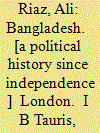

|
|
|
|
|
| Publication |
London, I B Tauris, 2016.
|
| Description |
xvi, 317p.: tables, figures, mapshbk
|
| Standard Number |
9781780767413
|
|
|
|
|
|
|
|
|
|
|
|
Copies: C:1/I:0,R:0,Q:0
Circulation
| Accession# | Call# | Current Location | Status | Policy | Location |
| 059060 | 954.92/RIA 059060 | Main | On Shelf | General | |
|
|
|
|
| 5 |
ID:
129205
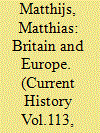

|
|
|
|
|
| Publication |
2014.
|
| Summary/Abstract |
After a tumultuous professional marriage of just over 40 years, Britain and Europe are facing the possibility of divorce. In January 2013, Prime Minister David Cameron decided to celebrate Britain's 40th anniversary as a member of the European Union by pledging a fundamental renegotiation of his country's terms of membership. Cameron further promised to submit any renegotiated deal to a clear "in-or-out" referendum in 2017 on whether or not to leave the EU, assuming his own Conservative Party wins a majority in the next general election in May 2015. Egged on by his party's growing ranks of restive Euroskeptics and trying to fight off a challenge on his right flank from populist Nigel Farage's UK Independence Party (UKIP), Cameron rolled the dice. He hoped to settle once and for all the Europe question, which has so often cast a dark shadow over the political debate in Westminster and Whitehall. Renegotiating
|
|
|
|
|
|
|
|
|
|
|
|
|
|
|
|
| 6 |
ID:
127558
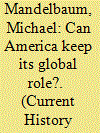

|
|
|
|
|
| Publication |
2014.
|
| Summary/Abstract |
Almost one hundred years ago events took place that propelled the United States on the path to the global role it plays today. World War I drew the country from the edge of international politics to the center. In 1917 America entered the war, dispatching troops to the European continent for the first time in its history. The United States withdrew from the security affairs of the continent during the interwar period, but returned in World War II, playing a larger role in Europe than in the previous conflict while simultaneously waging another major war, against Japan, in the Pacific.
|
|
|
|
|
|
|
|
|
|
|
|
|
|
|
|
| 7 |
ID:
101063
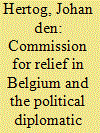

|
|
|
|
|
| Publication |
2010.
|
| Summary/Abstract |
During the First World War, the Commission for Relief in Belgium (CRB) supplied occupied Belgium with food, provoking discord between military and political leaders on both sides. The CRB's work undermined the Allies' economic blockade of the enemy, attracting military criticism. In Germany, politicians favoured sustaining the food supply to prevent unrest, whilst the Army wanted to exploit Belgium's resources. From 1916 onwards, the CRB became a bone of contention in Germany in the dispute between military and political leaders about unrestricted submarine warfare. It also loomed large in the political and military debate about the attitude to neutral countries: the Allies wanted them to brave the German threat and cooperate with the blockade policy-otherwise, food imports from Allied countries would be forbidden. Tonnage and food for the CRB were incorporated into the negotiations with neutral countries about their imports and the use of home-grown produce. The debates about the CRB thus exemplify the relationship between military events and the war's economic and social significance. This study of the CRB shows that political/diplomatic historiography can bridge the gap between the military and socioeconomic history of the First World War.
View Full Text Article
|
|
|
|
|
|
|
|
|
|
|
|
|
|
|
|
| 8 |
ID:
131791
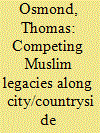

|
|
|
|
|
| Publication |
2014.
|
| Summary/Abstract |
Between the Middle East and Eastern Africa, the city of Harar is often considered as the main historical centre of Islam in Ethiopia and the Horn of Africa. Until recently, the cultural hegemony of the Muslim elites inhabiting Harar was commonly opposed to the almost pagan behaviours of the Oromo - or 'Galla' - farmers and cattle herders living in the wide rural vicinity of the town. The 1995 Constitution provided the different 'ethnolinguistic nationalities' of the new Ethiopian federation with the same institutional recognition. However, the institutionalisation of the two Harari and Oromo 'nationalities' seems to foster the historical duality between the city-dwellers and their close neighbours. This article proposes another political history of Harar and its ambivalent Oromo partners through the local dynamics of the Muslim city/countryside models. It reveals the both competing and complementary orders that have probably bound together the populations of Harar and its rural hinterland for more than five hundred years.
|
|
|
|
|
|
|
|
|
|
|
|
|
|
|
|
| 9 |
ID:
130958
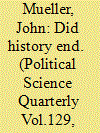

|
|
|
|
|
| Publication |
2014.
|
| Summary/Abstract |
IN A 1989 ESSAY, FRANCIS FUKUYAMA ADVANCED the notion that, with the death of communism, history had come to an end.1 This somewhat fanciful, and presumably intentionally provocative, formulation was derived from Hegel, and it has generally been misinterpreted. He did not mean that things would stop happening-obviously a preposterous proposal.2 Rather, he contended that there had been a profound ideological development. With the demise of communism, its chief remaining challenger after the extinguishment earlier in the century of monarchy and Fascism, liberalism-democracy and market capitalism-had triumphed over all other governmental and economic systems or sets of ordering principles. Looking for future challenges to this triumph, he examined the potential rise of destructive forms of nationalism and of fundamentalist religion, but found them unlikely to prevail. Thus, the triumph of liberalism was likely to be permanent.
This article evaluates developments over the subsequent quarter century and argues that Fukuyama seems to have had it fundamentally right. Beginning with the countries of Eastern Europe, democracy continued its progress after 1989. Moreover, capitalism increasingly came to be accepted, so that when the world plunged into widespread economic crisis after 2007, proposed remedies variously recommended tinkering with the system, not abandoning it.
In the meantime, violent forms of nationalism that surged in some places in the last decade of the old century scarcely proved to be much of a challenge to these trends, and the same seems likely to hold for violent forms of fundamentalist religion that surged in some places in the first decade of the new one. In fact, the significance of both of these illiberal developments seems to have been much exaggerated.
In addition, there was a striking decline of civil warfare during the decade after 1989 to low levels that have held now throughout the new century.
|
|
|
|
|
|
|
|
|
|
|
|
|
|
|
|
| 10 |
ID:
082682
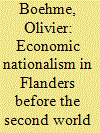

|
|
|
|
|
| Publication |
2008.
|
| Summary/Abstract |
In this article the author makes the claim that economic nationalist ideas had their origins in the Flemish Movement before the First World War and were further developed in the interwar period. This is an important modification of the classical view that Flemish nationalism before the Second World War was mainly focused on the linguistic and cultural situation in Belgium. Central to this contribution is the view of economic nationalism as an ideology using social and economic means for nationalistic purposes, although there are variations in the degree to which economy and nationalism are tools or purpose. In any case there was not much consistency, because there were different views on what constituted the interests of the 'Flemish nation', and which social and economic principles should be adopted. In addition, a movement that did not show much unity could not construct a homogeneous social-economic agenda
|
|
|
|
|
|
|
|
|
|
|
|
|
|
|
|
| 11 |
ID:
108787
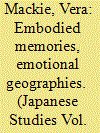

|
|
|
|
|
| Publication |
2011.
|
| Summary/Abstract |
In this article I carry out a close reading of Nakamoto Takako's book, My Diary of the Anpo Struggle (1963). Nakamoto was a writer and activist who was active in leftwing politics, the labour movement and the proletarian literature movement in the 1920s and 1930s and returned to the movement after 1945. Her published diary recounts her participation in the struggle against the renewal of the US-Japan Security Treaty and her other political activities. The book is a mixture of personal memory and political history and provides us with a distinctive 'map' of one person's emotional geography of Tokyo.
|
|
|
|
|
|
|
|
|
|
|
|
|
|
|
|
| 12 |
ID:
128291
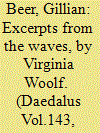

|
|
|
|
|
| Publication |
2014.
|
| Summary/Abstract |
Here is a hall where one pays money and goes in. where one hears music among somnolent people who have come here after lunch on a hot afternoon. We have eaten beef and pudding enough to live for a week without tasting food. Therefore we cluster like maggots on the back of something that will carry us on. Decorous, portly - we have white hair waved under our hats: slim shoes: little bags: clean-shaven cheeks: here and there a military moustache. not a speck of dust has been allowed to settle anywhere on our broadcloth. Swaying and opening programmes. with a few words of greeting to friends. we settle down. like walruses stranded on rocks. like heavy bodies incapable of waddling to the sea. hoping for a wave to lift us. but we are too heavy. and too much dry shingle lies between us and the sea. We lie gorged with food, torpid in the heat. Then. swollen but contained in slippery satin. the sea-green woman comes to our rescue. She sucks in her lips. assumes an air of intensity. in?ates herself and hurls herself precisely at the right moment as if she saw an apple and her voice was the arrow into the note. 'Ah !' "An axe has split a tree to the core: the core is
warm: sound quivers within the bark. 'Ab.' cried a woman to her lover, leaning from her window in Venice. 'Ah. Ah !' she cried. and again she cries 'Ah !' She has provided us with a cry. But only a cry. And what is a cry? Then the beetle-shaped men come with their violins: wait; count; nod; down come their bows. And there is ripple and laughter like the dance of olive trees and their myriad-tongued grey
|
|
|
|
|
|
|
|
|
|
|
|
|
|
|
|
| 13 |
ID:
039598
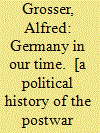

|
|
|
|
|
| Publication |
London, Pall Mall Press, 1970.
|
| Description |
vi, 378p.Hbk
|
| Standard Number |
0269027866
|
|
|
|
|
|
|
|
|
|
|
|
Copies: C:1/I:0,R:0,Q:0
Circulation
| Accession# | Call# | Current Location | Status | Policy | Location |
| 008280 | 943.087/GRO 008280 | Main | On Shelf | General | |
|
|
|
|
| 14 |
ID:
128290
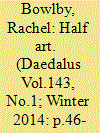

|
|
|
|
|
| Publication |
2014.
|
| Summary/Abstract |
In this piece. I look at an essay that l have probably read too often not to find in it the key to all matters
aesthetic, historical. philosophical, and more. The essay is Charles Baudelaire°s Le Peintre de la vie modeme (The Painter of Modern Life), first published in 1863 and written, most probably, around 1859 to 1860. Baudelaire's exhilarating innovation is to down- play the signi?cance of eternal value in art. in favor of what he designates as its other half, the ?eeting presentness that is modernity. My essay is unapologetically an appreciation - for the most part - of a text that, in focusing on another artist, itself appears to be just that.' For Baudelaire develops his arguments through a mock-anonymous celebration of the artist Constantine Guys, referred to as M. G. (Monsieur G.). Guys's proli?c sketches, done at speed, for rapid journal publication, chart the smallest of day-by- day changes and typical scenes in contemporary life. Guys's pictures - the art of modernity - give to the day a second life. and "translate" into a different medium - from sight to (mental) impression to its "rebirth" as a sketch - that which would otherwise be lost with its passing.
|
|
|
|
|
|
|
|
|
|
|
|
|
|
|
|
| 15 |
ID:
108457
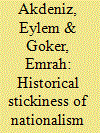

|
|
|
|
|
| Publication |
2011.
|
| Summary/Abstract |
This article revisits modern Turkish political history with a specific focus on trajectories of Turkish nationalism, from the end of the nineteenth century of the Ottoman Empire, to the forms it takes under Justice and Development Party (AKP) rule today. The discussion is theoretically embedded within a relational political-sociological framework that utilizes the "field analysis" approach developed by Pierre Bourdieu. Using this approach, this paper argues that a workable, explanatory political-sociological "surface" of analysis of Turkish politics might be "the political field." It further argues that inside this field of political forces and competing groups, there is an ordering principle that supplies the political actors with a set of beliefs concerning "what can be politicized for sustainable power." In this study, nationalism is treated as a kind of historically constituted and re-constituted "set of beliefs," or doxa in Bourdieu's terminology. The paper further explores two long-lasting "challenges" to Turkish nationalism, those of Islamist and Kurdish claims, and the recent trajectories of these two forms of politics inside the field.
|
|
|
|
|
|
|
|
|
|
|
|
|
|
|
|
| 16 |
ID:
128299
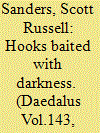

|
|
|
|
|
| Publication |
2014.
|
| Summary/Abstract |
I first read Walden when l was seventeen. the summer before starting college. at the urging of a high school teacher who sensed that my adolescent mind. brimming with questions, would bene?t from grappling with a truly radical thinker. Much of the book baf?ed me. The tone shifted unpredictably from conversational to prophetic, from jokey to stem, from earthy to mystical. I was bewildered by some of the lengthy sentences, which zigvagged among ideas and images. and l was stumped by the cryptic short ones. which seemed to compress whole paragraphs of meaning into a few words. Not yet having made any big decisions about how to lead my life, I couldn't ?gure out what was troubling this Henry David Thoreau. So what if his neighbors
thought he should use his Harvard degree to land a job and a wife, and then proceed to have kids, buy a
house. get rich. and distribute aims to the poor? Couldn't he just ignore the scolds and go his own way? Not yet having lost a loved one to accident. illness. or old age, I only dimly understood his brood- ing about that amoral process we call nature. So what if armies of red ants and black ants slaugh- tered one another, herons gobbled tadpoles, a dead horse stank up the woods, or a thousand seeds per- ished for each one that took root? What did all that mayhem and waste have to do with us, the owners of souls aiming at heaven ?
|
|
|
|
|
|
|
|
|
|
|
|
|
|
|
|
| 17 |
ID:
128294
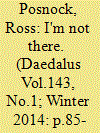

|
|
|
|
|
| Publication |
2014.
|
| Summary/Abstract |
Perhaps, like me. you have a propensity to collect books without quite knowing why. Over the years I have piled up books by and about, say, Ludwig Witt- genstein, Hannah Arendt, George Santayana, Philip Roth, Ad Reinhardt, Philip Guston, Franz Rosen- zweig, Penelope Fitzgerald, Thomas Bernhard - and not only not read them, but have no desire to do so. I have kept busy working on other things. And for a decade or two at a time. these texts simply gather dust on my shelves. But then, inevitably. I am drawn to these nearly forgotten volumes and. strangely, they prove pivotal to a new project: l recall. for instance, that Santayana ascended, literally, from the obscurity of a low shelf to earn a chapter in my book on William and Henry James. Wittgenstein made an analogous, if more circuitous, journey from the shadows, waiting untouched, until five years ago when I kept a long-held inner vow to read an- other languishing tome, one that had stared me down so often it had acquired an aura of intimidation: Stanley Cavell's The Claim of Reason: Wittgen-stein, Skeptirism, Morality and Tragedy. It was indeed intimidating. but also inspiring: that experience opened the door to more Cavell - and to deeper engagements with Emerson - and to Wittgenstein, who has joined the sage of Concord as a central ?gure in my current project on writers. artists. and philosophers who renounce their careers. The peculiarities of this manner of book buying - the absence of full consciousness and the long gap between acquisition and reading - puts me in mind
|
|
|
|
|
|
|
|
|
|
|
|
|
|
|
|
| 18 |
ID:
127571
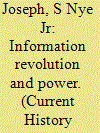

|
|
|
|
|
| Publication |
2014.
|
| Summary/Abstract |
One of the notable trends of the past century that will likely continue to strongly influence global politics in this century is the current information revolution. And with this information revolution comes an increase in the role of soft power-the ability to obtain preferred outcomes by attraction and persuasion rather than coercion and payment. Information revolutions are not new-one can think back to the dramatic effects of Gutenberg's printing press in the sixteenth century. But today's information revolution is changing the nature of power and increasing its diffusion. Sometimes called "the third industrial revolution," the current transformation is based on rapid technological advances in computers and communications that in turn have led to extraordinary declines in the costs of creating, processing, transmitting, and searching for information
|
|
|
|
|
|
|
|
|
|
|
|
|
|
|
|
| 19 |
ID:
118785
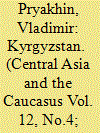

|
|
|
| 20 |
ID:
132115
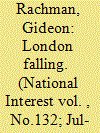

|
|
|
|
|
| Publication |
2014.
|
| Summary/Abstract |
LATER THIS year, the United Kingdom could disunite. In September, Scotland is due to vote on whether to become an independent nation. There is a strong chance that the Scots will vote to go it alone, breaking a political union with England that was established over three hundred years ago, through the Act of Union of 1707. The Scots number only 5.3 million of the United Kingdom's population of 63.7 million. But Scotland accounts for a large amount of Britain's territory and coastline-and contains several of the nation's finest universities, castles and golf courses. Moreover, Scotland is also where Britain's nuclear weapons are based, and the country's (dwindling) oil supplies are almost all located in Scotland's coastal waters.
|
|
|
|
|
|
|
|
|
|
|
|
|
|
|
|
|
|
|
|
|